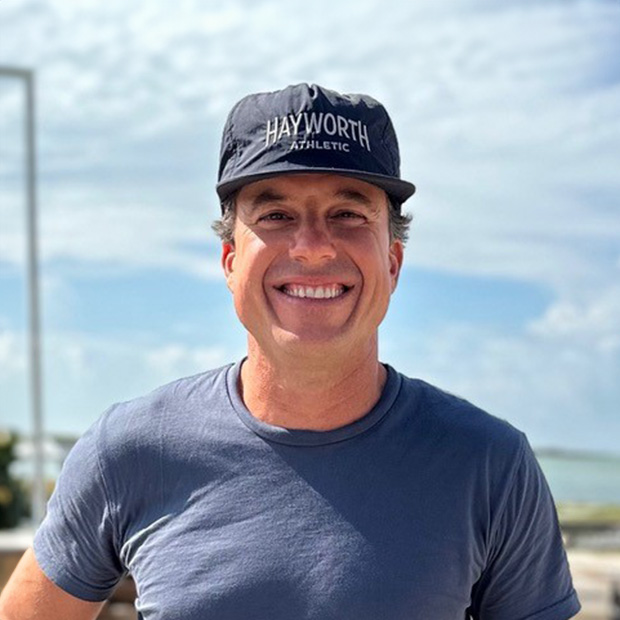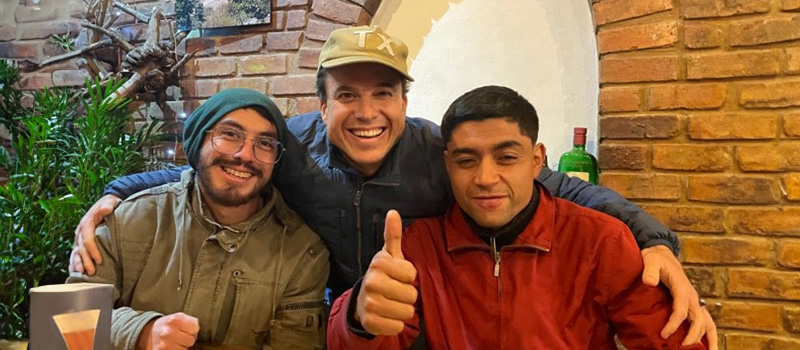Bucking industry trends
April 5, 2024 — In the small Colombian village of Mongui, some 10,000 feet above sea level in the Andes, sits a workshop where three men and two women stitch soccer balls by hand.
At $135 each, the balls are at the top of the mass consumer market in price and quality. They’re built to specifications set by the sport’s governing body, FIFA, for meeting standards ranging from weight and spirality to passing a bounce test, among other things.
 Justin Lea ’01
Justin Lea ’01
But what’s most unusual is that the workers, who are employed by Austin, Texas-based Hayworth Athletic, are paid a middle-class wage. It’s four times more than they’d been paid in the past to hand stitch soccer balls.
Hayworth Athletic is the brainchild of former attorney Justin Lea ’01. A two-sport athlete at Grinnell – in addition to soccer he played baseball and was an economics major – Lea first became interested in manufacturing soccer balls about 12 years ago.
At the time he was a lawyer working in Taos, New Mexico, and running a youth soccer league. He spent four years overseeing programming for 600 kids, raising money, and getting land donated for soccer fields. He attended soccer conventions and at one, he met a soccer ball company representative.
“While talking to this rep, I looked at the soccer ball he was holding and it said ‘Made in Pakistan,’” explains Lea. “Where and how the ball was made struck me in a way it had never struck me before.” He learned that 70 percent of the world’s soccer balls come from a single town in Pakistan.
Lea researched the industry and town, discovering sweatshop issues were rife in the manufacturing process. “I wanted to know how the ball was made and what conditions were really like, so I applied for a visa to go there.”
The conditions were poor, Lea confirmed, with workers hunched over all day sewing, earning 75 cents a ball that takes three hours to make. “So, I put my radical Grinnell hat on and thought, ‘What if I start a company in the center of all these sweatshop factories and paid a high wage to a select group of stitchers?’ I thought I could do more than complain about sweatshop labor.”
He made contacts and started planning a factory, but when his local business partner died in an accident, Lea set the project aside.
 Justin Lea ’01 celebrates Christmas Eve in 2022 with longtime friends and Hayworth Athletic colleagues Guillermo Blanco Ramirez, left, director of operations, and Jhon Fred Rincon, head of production.
Justin Lea ’01 celebrates Christmas Eve in 2022 with longtime friends and Hayworth Athletic colleagues Guillermo Blanco Ramirez, left, director of operations, and Jhon Fred Rincon, head of production.
He dove back into his legal career, then traveled from Kuala Lumpur to London for two years. Toward the end of his journey Lea reconsidered the soccer ball idea, and in 2018, he read about the town of Mongui, which has a long tradition of villagers who hand stitch soccer balls. After moving back home to Austin, he started thinking about building a factory in Colombia. “It’s not far away, and it’s in the same time zone,” he says.
Lea flew to Colombia, hired an interpreter in the village, met local folks, and for the next few years purchased equipment, imported materials, and honed and refined the ball-making process.
Hayworth made dozens of versions of the ball, finally settling on the 152nd prototype for their current product, the Hayworth Standard Ball. Up and running since fall 2023, the workshop currently produces 60 balls a month (with a capacity of 500 ball per month), which are for sale through Hayworth’s website. The company also provides balls to several soccer leagues in Austin.
Hayworth has an advisory board of five, including four sports-business savvy Grinnell grads: Eric Gautschi ’94, Shawn Hoy ’99, Amber Weinfurtner ’00, and John Palinski ’01. They’re currently working on a soccer lifestyle apparel line focusing on hoodies and sweats, with manufacturing processes that continue to embody the core mission of the company.
When he isn’t working on Hayworth, Lea uses his economic skills to oversee costs and labor as CFO of a small restaurant group based in northern New Mexico. And he previously spent four years as a consultant, bringing a line of tequila onto the market.
Hayworth Athletic’s soccer ball is the first of Lea’s own product ideas that he’s launched. The philosophy behind the high-quality, handmade product is simple.
“The exploitation of workers by paying them a low wage is atrocious, especially because they have no bargaining power, but we won’t get there by fighting the industry titans,” explains Lea. “If we approach the market with a positive message of what we’re doing, then we can relay that message to the consumer, and they can make choices on their own. That’s the path we’re taking.”
— by Jeremy Shapiro